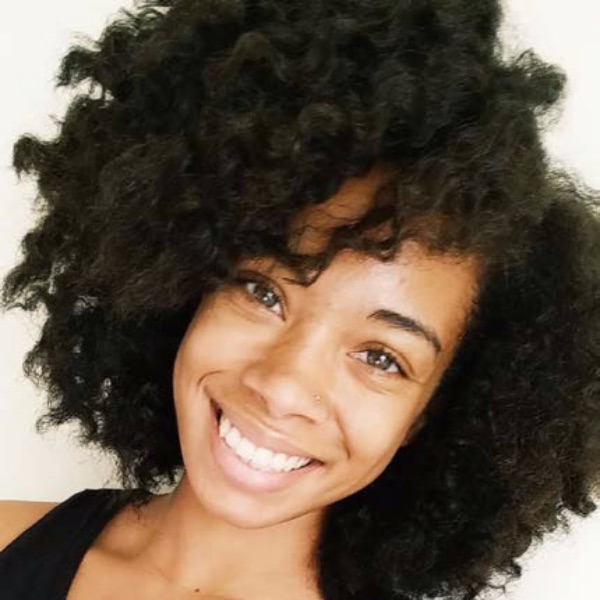It’s #BlackInPhysics week Oct. 25th to Oct. 31st, 2020! Find out more and follow along at blackinphysics.org and @BlackInPhysics on Twitter. This post is also part of our ongoing series #BlackInAstro. For our cornerstone post, see here.
In this installment, we are publishing an interview with Katrina Miller, a PhD candidate at the University of Chicago!

Katrina Miller didn’t take her first physics class until sophomore year of college. “Up until then, I had no desire to study physics,” she says, smiling. “I was always interested in astronomy as a child, but it was never something that I thought of as a potential career path for me.”
When she took an astronomy class for non-astronomy majors, Miller discovered that she had a talent for it. “I really connected with the professor, and he was like, ‘You really should try to take a physics class, see if you like it!’ And I always had an affinity for math as well, so it kind of came together. I ended up taking my first physics class and loved it!”
After graduating from Duke University with a Bachelor’s degree in physics and a minor in math, Miller joined the University of Chicago as a graduate student. She began her PhD searching for dark matter with the XENON1T experiment. After she earned her Master’s degree, she was awarded two fellowships and started to work on a neutrino experiment at Fermilab called MicroBooNE.
“The overarching physics goal of MicroBooNE is to determine the source of the low-energy event excess that was discovered in MiniBooNE [a previous experiment],” Miller says. “We’re hoping to use measurements of neutrino oscillations to see if we can push and find physics beyond the Standard Model, like sterile neutrinos.”
“MicroBooNE is a liquid argon time-projection chamber […] The cool thing about that is it gives us the ability to distinguish between events that are coming from electron showers and events that are coming from photon showers. […] If it’s coming from photon showers, it’s likely just a source of background noise that’s been incorrectly modeled. If it’s coming from electrons, there’s some indication that it’s coming from an oscillation involving a sterile neutrino.”
When Miller does science, she still brings her identity with her. “There’s really no getting away from my identity as a Black physicist,” she says. “And then you factor in that I’m a woman. Standing at the intersection of those multiple identities, it’s been an interesting time. These two identities are not separate from me. I can’t just go to work and be a scientist, I also have to go to work and deal with being a scientist while Black.”
What does it mean to do physics while Black? “That means I have to think about things that my white male colleagues don’t have to think about every day, including: Is this a safe space for me? Is this a place I’m going to be supported? Are there people here who are going to advocate for me when necessary?”
Plus, adds Miller, there’s “the additional pressure of needing to exist in this space, in this system, while often feeling like it’s trying to push you out. […] You’re not getting compensated for that extra work. I think about that a lot.”
Miller didn’t meet another Black woman in physics until her senior year of college. “I think that part of the reason why I never considered physics as a career was because I didn’t see anyone who looked like me,” she says. “You know, when you think of a physicist you think of Einstein, you don’t really think of people that look like me. I often wonder if I had seen that earlier […] maybe I would have signed up for that AP Physics class in high school, I would’ve realized that I liked it a lot earlier, I could have set myself up by doing research earlier in my academic trajectory.”
Miller points out that early preparation can make a big difference for Black students in academia. In undergrad, she says, “I didn’t really know anything about the PhD or grad school. I didn’t even know what I didn’t know!”
Fortunately, Miller had proactive mentors who helped shape her path into academia. “I can tell you with 100% certainty that I would not be a physicist if a professor did not come to me and really encourage me,” she says. “I was scared to get into research. I remember expressing, ‘Oh, research feels so intimidating, how do you get into it, how do you start it’ to another student, and a professor heard me and looked me up in the directory and emailed me about it. He had an opening in his group […] and that’s how I got into research.”
On the other hand, a bad mentoring experience made Miller further realize the importance of good mentorship. “Being a physicist and engaging in science is really only fun for me when I’m in a positive and supportive working environment. For me in particular, I know that wherever I work or wherever I go to school, I need to make sure that I’m surrounding myself with very supportive mentors and a strong support network.”
Miller emphasizes that building meaningful relationships in physics communities is more important than simply tokenizing Black students. “When I first got to graduate school, I was immediately bombarded with ‘hey, we want you for this diversity thing, this recruitment thing,’” she says. “I was so overwhelmed. I felt an obligation to be the representation I never had growing up.”
She’s since learned that it’s okay to set boundaries. “Something I’ve learned to do to filter out those opportunities is just to ask myself, ‘Is this opportunity going to be symbiotic in some way?’ An organization is getting something from me, but what in turn am I getting back? Whether that’s financial compensation, some relevant experience I can put on my CV, or […] something that I really want to do, or some sort of leveraging.”
So what are things non-Black folks in astro and physics communities can do to help Black people feel supported in this field? “I think there are a lot of things!” Miller says. “And it’s not all big—these big, sweeping statements of ‘Black Lives Matter’ and signing your name on petitions. Those are cool, but when it really comes down to it… you’re saying these things, but are you checking in with the Black folks at your institution? That new Black student who came into your program, are you making sure that they have funding? Are you making sure that they have someone to talk to, that they know where the allies are?
“When I was an undergrad, looking back I really took a lot of the experiences I had for granted because I just assumed that it was like that everywhere. Moving to a new institution, I was like ‘oh, I don’t know anybody here, nobody’s proactively setting me up with any mentors or anything. And now when something happens or when I don’t have a great experience, I don’t really have anyone to talk to. I don’t know who I can trust, who I can even go to when things are not going well.’ I think everyone wants to be involved when it’s these big, sweeping statements, but when it really comes down to it, community work matters. Before you start thinking about changing the physics community as a whole, what’s happening at your institution? Your department? Your research group?”
To learn more about Katrina Miller, check out her Twitter account! You can also check out her own words on being a Black woman in physics here. You might also be interested in #IAm, the scholarship initiative she co-founded with Rosalía Hernández.
“Beyond astro-ph” articles are not necessarily intended to be representative of the views of the entire Astrobites collaboration, nor do they represent the views of the AAS or all astronomers. While AAS supports Astrobites, Astrobites is editorially independent and content that appears on Astrobites is not reviewed or approved by the AAS.
Astrobite edited by: Luna Zagorac
Featured image credit: Astrobites collaboration


